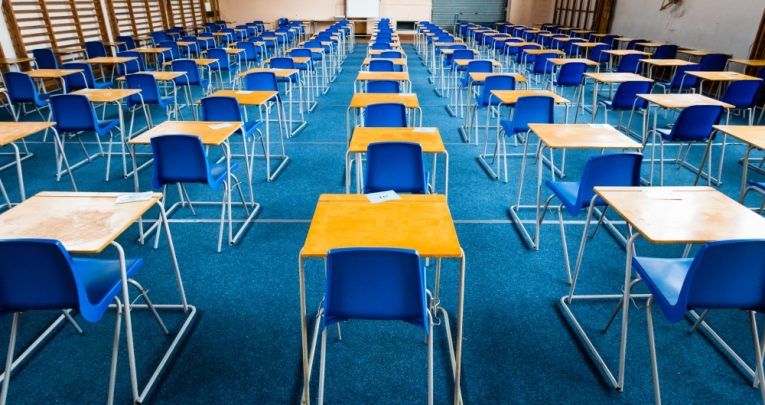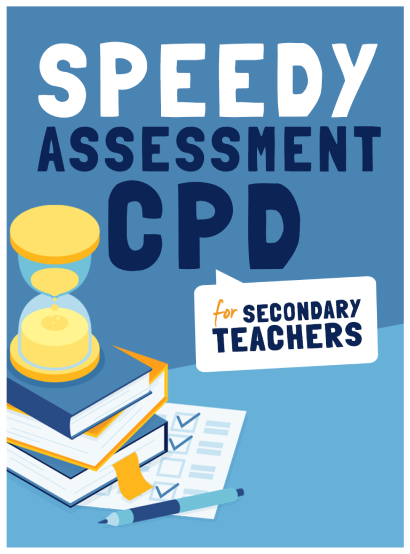Is this the end of the exam as we know it?

One casualty of the COVID-19 crisis may be the traditional exams system – but would that be such a bad thing, asks Amanda Barton…

A couple of days after the government’s shock announcement that external exams wouldn’t be taking place this summer, a friend sent me a WhatsApp a message which read ‘I’ve got my smiley, happy son back now his A-levels have been cancelled.’
I’d been wondering whether the media’s description of teenagers being ‘gutted’ by the news was entirely accurate. The message confirmed my suspicion that it’s not necessarily the whole of Generation Z who feel they’re being deprived of an opportunity – one which involves being anxiously hunched over a small, wobbly desk for hours on end in baking heat…
33 hours
One of the benefits of the pandemic (there has to be some) is that it’s forced us to question our everyday practices in education – such as the way in which we assess students at the end of a Key Stage – and consider whether there may be equally valid but less damaging alternatives to terminal examinations.
It’s long been accepted that a formal examination is the best way of assessing academic skills and knowledge. An exam is an effective means of comparing the abilities of multiple individuals, assessed using the same criteria over the same length of time. The latest GCSEs are a testament to the continuing belief that this method has value, with teenagers now sitting more exams than ever – around 33 hours’ worth.
Coursework has largely been dropped on the basis that it’s too easy to cheat. Plagiarism is rife, essays can bought online and parents are too willing to lend a hand. But are exams actually any more rigorous? Do their selling points outweigh the disadvantages? Or are they a lasting legacy of an otherwise archaic system, perhaps even used because they reflect how policy makers were themselves assessed?
England has one of the most exam-driven educational systems in the world. In 2019, partly in response to parents’ and teachers’ reports of the pressures these tests were exerting on the young, the Labour party included the scrapping of SATs for 7- and 11-year-olds in its election manfesto.
The memorisation game
If we are truly committed to supporting students’ mental health, then we ought to acknowledge the threat posed by traditional exams to those students who don’t cope well with periods of intense pressure, and who could be disadvantaged as a result. A third of all children failed their GCSEs last year, calling into question whether the current exams are genuinely fit for purpose, or whether their actual purpose may even be to demonstrate to children that they are failures.
Students who perform well in exams are likely to be those able to memorise large amounts of information. I can still recall the guilt I felt after receiving an A grade in chemistry. At 16 I knew full well that my achievement had nothing to do with me understanding the ins and outs of chemistry, and everything to do with being able to memorise a raft of formulae and the periodic table.
We need to consider the extent to which exams set out to merely test the skills required to pass exams – how fast students write, how quickly they can process information and how good they are at regurgitating information they’ve memorised when under pressure. Whilst some of those skills will play a role in their future workplace, they’re certainly not the only, or perhaps even most important ones.
A love diminished
A further downside is the impact that the current exams system has on wider motivation and learning. As teachers increasingly teach to the exam out of necessity, students’ interest in the relevant subjects is likely to wane. I’ve lost count of the number teenagers I know whose love of reading diminished once they began GCSE English literature. And don’t get me started on how it could ever be right to ‘assess’ something as subjective as poetry.
The administration of exams requires a huge investment in resources, both in terms of people – invigilators, examinations officers, markers, question setters – and paper, the latter being hard to reconcile with an eco-friendly agenda. And there’s still no guarantee that the exams our students take are watertight, or even reliable, as clearly demonstrated by last year’s A-level maths paper leak. Research published by Ofqual in November 2018 showed that on average, across all subjects at both A level and GCSE, roughly one grade in every four was wrong.
For a more inclusive alternative to exams that doesn’t involve heightening levels of anxiety, we could instead look to those methods deployed by vocational courses and used throughout the business sector, such as e-portfolios, adaptive computer-based testing and simulations. The new emergency system put in place for this summer’s exam cohorts relies to a far greater extent on teachers’ professional judgment – something many believe will likely result in a fairer and more accurate set of results.
For some, like my friend’s son, missing out on that 18th birthday party or the prom might be a price worth paying for not having to sit A-levels. The parties can happen later.
Dr. Amanda Barton is a writer, former MFL teacher and author of Getting the Buggers into Languages (Bloomsbury)












